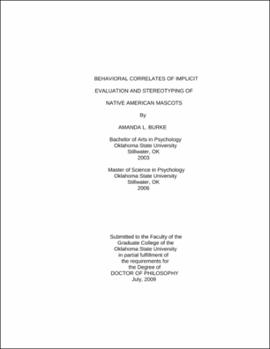| dc.contributor.advisor | Chaney, John M. | |
| dc.contributor.author | Burke, Amanda L. | |
| dc.date.accessioned | 2013-11-26T08:27:37Z | |
| dc.date.available | 2013-11-26T08:27:37Z | |
| dc.date.issued | 2009-07 | |
| dc.identifier.uri | https://hdl.handle.net/11244/6937 | |
| dc.description.abstract | Scope and Method of Study: The purpose of the present studies was to examine implicit biases toward Native American people and mascots using an Implicit Association Test (IAT), as well as to investigate the relationship between Native mascot IAT performance and race-biased behaviors toward Native Americans. Participants in Study 1 were 43 Caucasian students enrolled in psychology courses at Oklahoma State University. Participants individually completed the Implicit Association Test (IAT), which examined implicit bias toward Native people compared to Caucasian people. Participants in Study 2 were 42 Caucasian students enrolled at the same university. Each participant individually completed an attitudes survey and an IAT. The IAT examined implicit bias toward Native American mascots compared to Caucasian mascots. Additionally, 27 participants returned in 2 weeks for a second session involving working with a partner on tasks of various subjects (academic and nonacademic). Participants were told their partner was Native American, and they answered questions regarding perceived performance and enjoyment expectations of their partner, assigned which tasks the partner and themselves would complete, and were measured on how far they sat from their partner's belongings in a laboratory setting. A univariate analysis of variance on the IAT effect was conducted to determine if negative implicit bias was demonstrated toward Native people/mascots compared to Caucasian people/ mascots. Pearson's zero-order correlation was used for the remaining hypotheses to examine the relationship between mascot IAT performance and race-biased behavioral outcomes. | |
| dc.description.abstract | Findings and Conclusions: Results indicated that participants elicited implicit stereotype bias toward Native American people and mascots compared to Caucasian people and mascots. In Study 2, Native mascot IAT performance was correlated with perceived partner enjoyment of completing nonacademic tasks. The present data support conceptualizing the Mascot IAT as a measure of stereotype bias providing evidence that implicit stereotype bias elicited on the Mascot IAT has predictive ability in determining instrumental (i.e., judgments, initial impression) behaviors toward Native Americans. Future studies should examine the extent to which these implicit biases are related to other forms of race-biased behaviors. | |
| dc.format | application/pdf | |
| dc.language | en_US | |
| dc.rights | Copyright is held by the author who has granted the Oklahoma State University Library the non-exclusive right to share this material in its institutional repository. Contact Digital Library Services at lib-dls@okstate.edu or 405-744-9161 for the permission policy on the use, reproduction or distribution of this material. | |
| dc.title | Behavioral correlates of implicit evaluation and stereotyping of Native American mascots | |
| dc.contributor.committeeMember | Leffingwell, Thad Ryan | |
| dc.contributor.committeeMember | Page, Melanie C. | |
| dc.contributor.committeeMember | Van Delinder, Jean | |
| osu.filename | Burke_okstate_0664D_10390 | |
| osu.accesstype | Open Access | |
| dc.type.genre | Dissertation | |
| dc.type.material | Text | |
| thesis.degree.discipline | Psychology | |
| thesis.degree.grantor | Oklahoma State University | |
